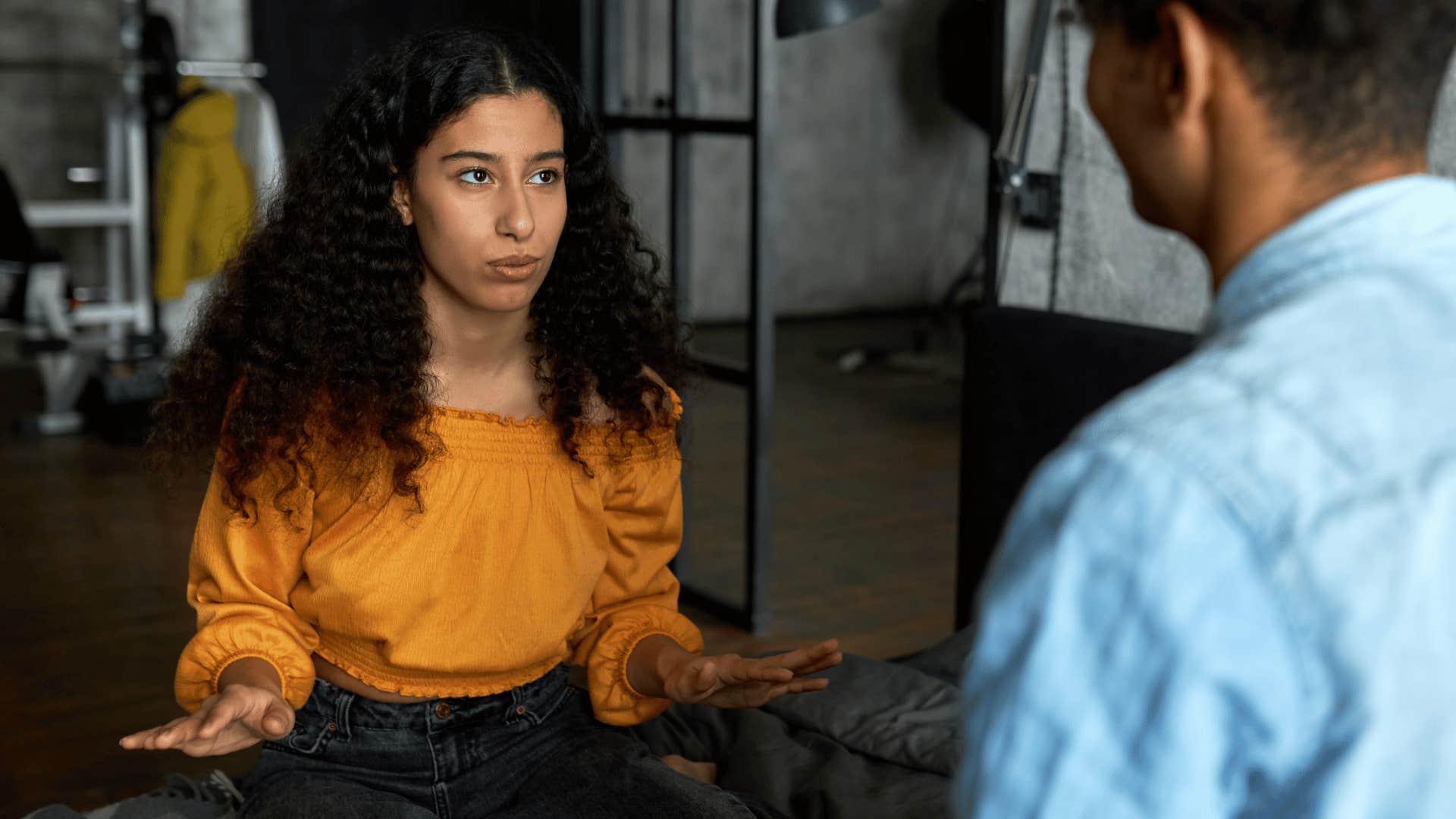11 Low-Effort Things Happy People Do Once They Learn To Protect Their Peace
Once you know how much your own peace means to you, things will never be the same.
 Roman Samborskyi / Shutterstock
Roman Samborskyi / Shutterstock Life has been a bit chaotic lately for the average person. With prices soaring and pay seemingly not getting any better, it's already difficult for people to protect their inner peace. Stress has consumed many of us, making it nearly impossible to see the the light at the end of the proverbial tunnel. Still, there are some low-effort things happy people do once they learn to protect their peace that you can start giving a try yourself in order to see the brighter side of things.
From practicing gratitude daily to unfollowing toxic or unhelpful accounts, these tiny actions can have a huge impact on your emotional and physical health. By slowly integrating these habits into your daily routine, you can feel happier too.
These are 11 low-effort things happy people do once they learn to protect their peace
1. They set boundaries
 Anatoliy Karlyuk | Shutterstock
Anatoliy Karlyuk | Shutterstock
After finding peace, most people struggle to maintain that peace indefinitely. From problematic family members to weird coworkers, it can be hard to feel at peace when everyone else feels determined to make their lives harder. That is why one low-effort thing happy people do once they learn to protect their inner peace is set boundaries.
Most people might roll their eyes once they hear the infamous advice of setting boundaries. After all, isn't the whole setting boundaries scheme a bit overplayed? However, setting limits is essential in every aspect of life. From romantic relationships to work relationships, setting boundaries can either make or break someone's mental health.
This is probably why people who refuse to set a work-life balance end up experiencing greater burnout. While they might have the best of intentions, refusing to set boundaries can easily lead to greater stress. So, while setting boundaries might not feel so great and can be very awkward, for the average person, it'll often be the difference between keeping their mental health intact or watching it crumble completely.
That being said, how can people better set boundaries? According to clinical psychologist Rubin Khoddam Ph.D., by identifying what someone's limits are, clearly communicating those boundaries, practicing what they want to say beforehand, avoiding apologizing and explaining, and being consistent with their boundaries, just about anyone can set limits in their everyday relationships.
2. They unfollow unhelpful or toxic accounts
 insta_photos | Shutterstock
insta_photos | Shutterstock
How many people follow supermodels, problematic influencers, and unhealthy fitspo influencers online? If someone were to ask the average person, they'd probably say too many to count. Let's face it: most of us are chronically online to the point that it's impacted our mental health for the worse.
From wishing that they looked like they had money like this person to hard crash dieting to look like this person, these social media influencers have completely turned people's lives around by portraying an often unrealistic or damaging lifestyle. This is why a low-effort thing happy people do once they learn to protect their peace is unfollowing unhelpful or toxic accounts.
Sure, it might be difficult to go through the mass amount of people someone follows and unfollow toxic or unhelpful accounts. But their mental health and inner peace is worth it. According to a study published in 2022, problematic social media use was linked to higher rates of depression, especially among women. So, while ignoring or continuing to follow someone might be tempting, doing so at the cost of their mental health is never the answer.
3. They practice daily gratitude
 mimagephotography | Shutterstock
mimagephotography | Shutterstock
When people finally gain their sense of peace they often quickly lose it as reality sets in. In their head, they know they should look at the brighter side of things. But, when their car breaks down and now they can't afford to make omelets in the morning because egg prices cost more than a Hulu subscription, well that can cause even the most positive person to sour.
This is why a low-effort thing happy people do once they learn to protect their peace is practice daily gratitude. Now, understandably, most people might roll their eyes at the prospect of practicing gratitude. After all, nobody cares about gratitude when they have bills to pay, right?
That being said, if people want to protect their peace then practicing gratitude is a must. According to Harvard Health, gratitude is linked to greater happiness. Even so, most people wouldn't even know where to start. So, if someone wants to practice gratitude then the best place to start is by journaling it.
Psychologist and faculty member at the University of Arizona Global Campus Jessica Koehler, Ph.D., explained that people should take time each day to write a few things they feel grateful about. "This practice helps you focus on the positive aspects of your life and cultivate a sense of appreciation for the good things that you have," she stated.
4. They cut off drama in their lives
 Pheelings media | Shutterstock
Pheelings media | Shutterstock
As much as people say they can't stand the drama, there's a reason why Bridgerton is popular. Let's face it: everyone likes a little gossip to spice up their life every once in a while. When at dinner with their family or friends, it can be exhilarating to hear who did what or how this person is pregnant with this person's baby.
Still, if people want to protect their peace, then a low-effort thing happy people do once they learn to protect their peace is cut off the drama in their lives. As exciting as gossip is, people who gossip the most might sometimes be the most drama-starting people someone's ever met in their lives.
This isn't great, as drama can easily add more stress to people's lives. So, while gossip is great and all, limiting or cutting off people who start drama is the only one to keep people's peace intact. Now, is this always easy? Absolutely not, however, by limiting contact and slowly separating themselves, it'll be much easier to cut off someone without completely causing a scene.
5. They incorporate self-care into their routine
 Mariaa Boiko | Shutterstock
Mariaa Boiko | Shutterstock
When was the last time someone put a face mask on or read a book before falling asleep? When most people think about it, it's probably been more than a hot minute. Understandably, everyone's gotten busy and barely thinks about taking care of themselves beyond the minimum. However, maintaining the same schedule and never incorporating self-care can grow stale and boring.
After all, everyone wants to feel taken care of or beautiful. Plus, self-care is the greatest tool to relax and release any stress that people have lingering at the end of the day. One study published in 2024 found that self-care decreases stress and improves mental health. Even so, incorporating self-care is far from easy.
How many people truly have the energy to put on a face mask or meditate every single day, right? Yet, this is the reason why people should start off small and work their way up. By beginning once a week for thirty minutes, someone can slowly grow more accustomed to incorporating some form of self-care into their daily routine.
6. They take breaks in between their busy schedules
 ViDI Studio | Shutterstock
ViDI Studio | Shutterstock
One low-effort thing happy people do once they learn to protect their peace is to take breaks in between their busy schedules. When most people work they do their utmost to power through the day. Wanting to 'relax' and go home, these individuals will refuse to take a break because their break will come once they are in their bed. However, this type of mentality isn't great in the long run.
Like it or not, powering through the day with zero breaks is bound to burnout even the strongest of people. According to the University of North Carolina at Chapel Hill, breaks can reduce stress levels making it much easier to refocus. That being said, how can people take breaks throughout their busy day?
Cornell University noted that breaks should be between five to 60 minutes as this will help increase focus and productivity. They also explained that taking a break by using social media doesn't work well as a purposeful break. Instead, people should be meditating, reconnecting with nature, taking a shower, allowing themselves to daydream, cooking a healthy meal, or even talking to a coworker or friend. Just be sure to set a reminder for that break. You wouldn't want to go over that time limit and have even more work to do, right?
7. They limit social media consumption
 Arthur Bargan | Shutterstock
Arthur Bargan | Shutterstock
Back in the day, social media wasn't as time-consuming as it is now. Sure, people would go on MySpace or Tumblr and post their updates. However, at the end of the day, people would continue to interact with their families and go outside to play with their friends. Unfortunately, times have changed since then.
Nowadays, with the rise of TikTok and Reels, people have become entirely too addicted to social media and as a result, rarely interact with people daily. According to the American Psychological Association, 37% of teens said they spent five or more hours a day on social media. Despite this concerning fact, social media consumption doesn't seem to be slowing down as more people join these apps every single day.
To protect their peace, a low-effort thing happy people do once they learn to protect their peace is to limit their social media consumption. That's not to say they won't go on social media entirely. Let's be real: everyone wants to unwind and have a good laugh. However, balance is key to keeping their mental health in check. Joe Whittington, MD, a board-certified emergency medicine specialist recommended that people limit their use to 20-30 minutes three times a day. And so long as people follow this rule, they should find it much easier to protect their peace in the long run.
8. They surround themselves with positivity
 JLco Julia Amaral | Shutterstock
JLco Julia Amaral | Shutterstock
When people hear others tell them the importance of surrounding themselves with positivity they may sigh and shake their heads in annoyance. Yes, cut off all toxic friends, most people know that. However, surrounding themselves with positivity is much more than just having good friends. Rather, surrounding themselves with positivity also includes their daily consumption.
How many people doom-scroll through TikTok or demean themselves on a daily? Or, how many people are currently working jobs that make them unhappy or listen to music that isn't uplifting? What about the books they read or the goals they have for themselves?
All of these things, count as well. And while this might sound like a pain to review and change, according to News in Health, positivity is important as it leads to better mental and physical health. So, as painful as it may be, slowly finding ways to make their day just a little bit more positive is another low-effort thing happy people do once they learn to protect their peace.
9. They go outside more
 Drazen Zigic | Shutterstock
Drazen Zigic | Shutterstock
When was the last time someone spent more than twenty minutes outside? Most people are scared to admit that it might've been a hot minute. From being too busy to simply not having the energy to, it seems more happy people are keen to stay in the comfort of their home rather than venture outside.
And although everyone is entitled to do what makes them most happy, a low-effort thing happy people do once they learn to protect their peace is to go outside. It should go without saying that going outside is great for many reasons. Most notably, the American Psychological Association noted that going outside leads to improved attention, lower stress, and better mood.
Despite this fact, many people have become increasingly more introverted as staying at home has skyrocketed. As a result, more people are finding that their mental health is being impacted, causing them to lose the inner peace they tried so hard to protect. So, while being a homebody is great, be sure to spend a little time outdoors. Remember: even ten minutes is better than zero.
10. They declutter regularly
 JJ-stockstudio | Shutterstock
JJ-stockstudio | Shutterstock
How many people declutter their home regularly? Understandably, not everyone has time to keep up with the dishes and fix their bed. Life gets easy and as a result, people forget to do their chores or save it for later. Unfortunately, doing this too much can impact people's mental health for the worse.
Not many people can claim that coming home to a messy home makes them feel better. On the contrary, many people can admit that messy homes make it harder to clean or function properly as it can cause an unbelievable amount of stress. So, what is a low-effort thing happy people do once they learn to protect their peace?
Though it might sound exhausting to hear, many happy people actively declutter their homes. Now, sure, not everyone has time to spend hours cleaning their home every day, especially if they have kids. Yet, a good trick could be to focus on the rooms that count the most. From the bedroom to the kitchen, these are probably the best rooms to get started on. As the week progresses, people can slowly focus on other rooms.
That being said, things are bound to get messy regardless of how much they try. This is why setting chore schedules or simply only cleaning up their mess are people's best, otherwise, they might unintentionally drive themselves insane.
11. They limit multitasking
 insta_photos | Shutterstock
insta_photos | Shutterstock
Finally, the last low-effort thing happy people do once they learn to protect their peace is limit multitasking. Now, this might be a hard thing to do for the average person. After all, who wants to spend more time working on something than simply doing everything at the same time chaotically?
However, like it or not, most people can agree that multitasking is far from protecting their inner peace. Trying to focus on multiple things at a time is very damaging to people's mental health. When they have a lot on their plate, adding on more steps can become confusing and cause people's work quality to crumble as they split their attention.
This is why people should set timers and schedules instead of depending on multitasking to get them through the day. Now, is this habit a bit annoying and a little bit more time-consuming? Yes, however many people will find that refusing to multitask and focusing on one thing at a time is better for their mental health than chaotically completing things will ever be.
Marielisa Reyes is a writer with a bachelor's degree in psychology who covers self-help, relationships, career, family, and astrology topics.

